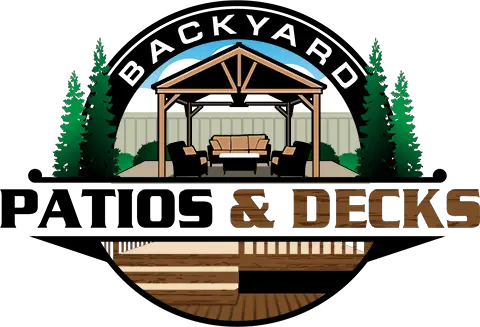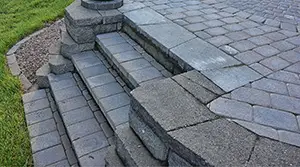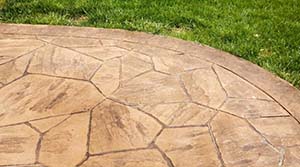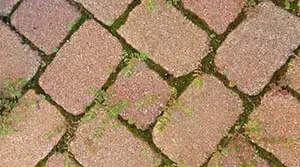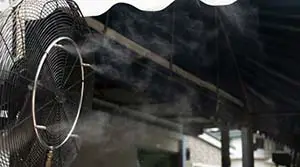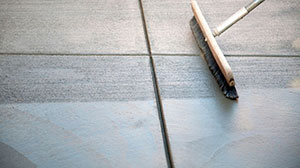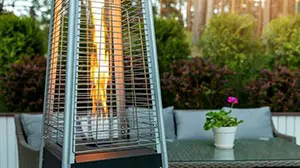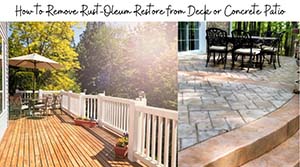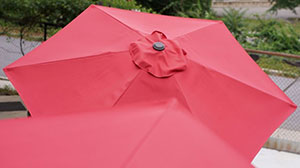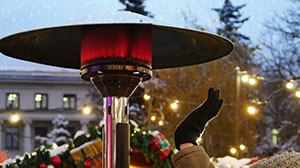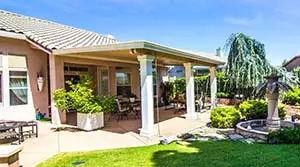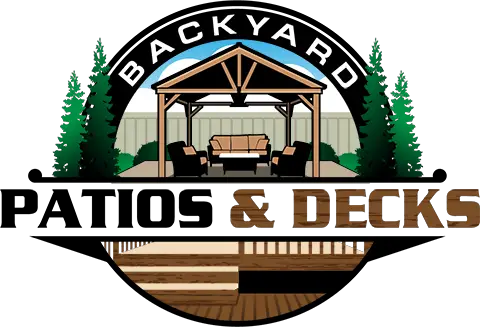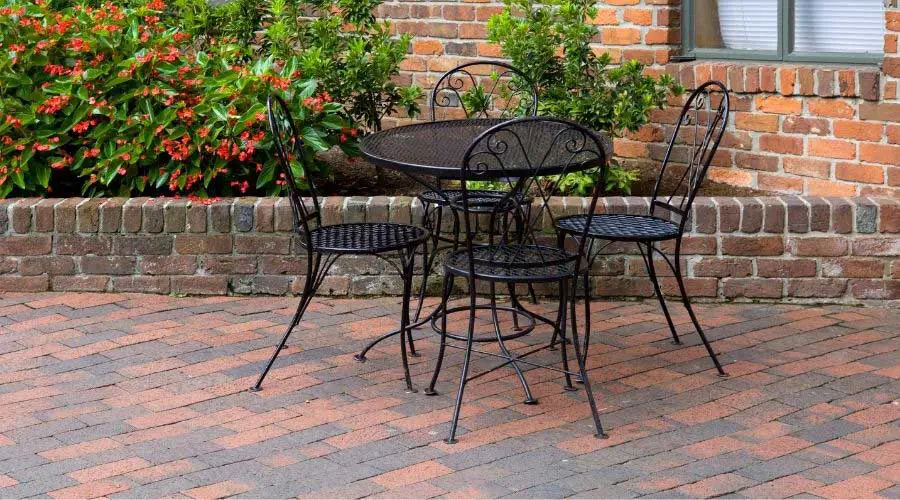
Most people prefer laying brick patios since they’re incredibly durable and have low maintenance. However, after laying brick patios, there are times when you realize that they are dirty and grimy than usual. In such a situation, there are ways that you can make them clean again regardless of how dirty they are.
Cleaning a brick patio can be as easy as sweeping it with a regular broom or using multiple cleaners. The best way to clean a brick patio depends on what kind of stain it has and how well-maintained it is. Pressure washing your dirty deck isn’t always needed as there are many effective ways you can do it instead of damaging the bricks.
Here, we explore different ways to clean a brick patio without using a pressure washer.
How Do You Clean a Brick Patio Without a Pressure Washer?
The dirty brick patio can develop unattractive stains and discoloration. Using a power washer releases a forceful spray of water to get rid of grime, but the pressure can damage old mortar, ruin nearby plantings, and break windows.
You can therefore clean the brick patio without a pressure washer to limit chances of accidents. However, you’ll require more effort and time to do so.
For instance, cleaning the brick patio with muriatic acid or oxygen bleach brick cleaner can remove dirt and moss stains without special equipment.
Below are steps to clean a brick patio effectively:
1. Prepare the Area
The first step is to prepare the area around the brick patio. It would help if you covered any plants near the brick patio to prevent them from cleaner splashes. Ensure that the cleaning day is cloudy or there is a shadow to avoid the cleaner from drying out quickly.
2. Clean the Brick
Now to begin the journey of cleaning your brick patio. Firstly, you’ll want to sweep the brickyard with a clean brush or small hand brush. Sweeping debris will help you eliminate loose dirt or moss that may be growing behind the brick patio.
Make sure to use a garden hose containing a spray attachment to spray your patio down with.
You can then spray your brick with a garden hose containing a spray attachment. The spray will remove surface dust and dirt but with less pressure compared to a power washer.
Afterward, soak the brick thoroughly before cleaning it further. A more saturated brick patio means that the cleaner will stay on the surface rather than absorb it.
3. Prepare Your Cleaner
Wear goggles and rubber gloves for protection. Avoid chlorine bleach since it can be harsh on your brick patio compared to other brick cleaning solutions.
Instead of chlorine bleach, go for the oxygen brick patio cleaner, available in powder and liquid form. As we have highlighted above, protection for your eyes and hands is critical.
If you settle on the powdered oxygen brick cleaner, add a small amount of water to allow for toothpaste consistency. For the liquid cleaner, follow the package guidelines on dilution and use.
Acidic brick patio cleaners such as muriatic acid are available in liquid form. Pour the acid into water and then brush the solution on the brick. Do NOT pour the acid first. Running the water first will avoid unsafe acid splashes.
4. Scrub the Brick
Apply your cleanser with a long-handled brush and scrub well. Avoid using wire brushes since they can leave rust stains on the mortar or brick.
Before cleaning the whole brick patio area, test with a small size to ensure that the cleaner won’t discolor the brick patio.
5. Wash Off Your Cleaner
Use clean water to wash off the cleaner after scrubbing. If you leave the cleaner on the brick patio, it might get discolored. Scrub dingy once more and then rinse thoroughly. Here are some things you’ll need:
- Bucket
- Gloves
- Stiff brush
- Garden hose spray nozzle
- Goggles
- Brick cleaning liquid or powder
Will Vinegar Damage Bricks?
Vinegar isn’t safe for use on brick patios. It can lead to damages that might force you to make costly replacements.
However, if you decide to use it, follow the following steps:
1. Mix equal parts of water and white vinegar.
2. Pour the solution on the brick patio and use a brush to scrub the surface.
3. After you have washed your brick patio with the solution, you must neutralize the acid with diluted ammonia or any other alkaline solution.
4. After applying the alkaline solution, rinse the patio with water.
What is the Best Cleaner for Concrete?
The best cleaners for concrete, whether dry or liquid, are those that attack stains and dirt deep below the surface. However, you need to match the type of stain to the cleaner to get effective results.
Let’s go through the best cleaners in the industry:
| Cleaner | Pros | Cons |
|---|---|---|
| RMR-86 Instant Stain Remover Spray | – Works on a variety of surfaces. – It has fast action even without scrubbing. – The cleaner removes mildew and mold. – It can even reach stains that are below the surface. | – It has a toxic formula, so you must put on protective clothing and get pets and children from the application area. – It might strip off paint from concrete or bricks. |
| Sheiner’s All-Purpose Cleaner | – It functions effectively on all types of surfaces. – The product is pH neutral, thus perfect for all surfaces. – It gets rid of odors and stains with ease. – It offers durable stain resistance. | – It has a strong fragrance. – The product might leave leaks. |
| Zep Concrete Pressure Cleaner Concentrate | – It works on stone, brick, and asphalt. – The product removes grime and oil stains. – It offers value for money. – The cleaner restores the original state of concrete regardless of the stains. | – It isn’t ideal for sealed concrete. – It would be best if you had a pressure wash to apply this cleaner. |
| Zep Heavy-Duty Cleaner | – It’s a heavy-duty cleaner. – It works quickly and efficiently. – It removes dried and tough grime, grease, and oil stains. – The cleaner is easy to use, especially with its color-changing assistant. | – It requires scrubbing. – The powder might solidify in the package. |
| Eco-Friendly Cleaner | – It’s easy to use – The product is eco-friendly. – It works on different surfaces. – It cleans a variety of stains. | – It’s expensive – Some customers complain that the stain reappears after a while |
1. RMR-86 Instant Stain Remover Spray
This cleaner is the best option there is for mildew and mold. It’s an instant stain remover and is perfect for removing stubborn mold, mildew, and black mold.
The product is a fast-acting spray that functions almost immediately after application. It targets virtually any stain, no matter how deep it’s embedded.
Apart from applying it on concrete, you can also use it on grout, under sinks, bathroom tiles, shower doors, decks, wood, and tubs.
They are also ideal for bricks, drywall, vinyl siding, and other areas where mildew and mold are likely to occur.
RMR-86 Instant Stain Remover is a potent formula that can get rid of any unpleasant odors. In fact, after applying the cleaner, it’ll leave a more refreshing scent behind.
It comes in quantities of 128 ounces. However, the product isn’t eco-friendly, meaning you should take safety precautions while applying it.
2. Sheiner’s All-Purpose Cleaner
If you seek the best pH-neutral product, Sheiner’s all-purpose floor cleaner is the best solution. The cleaner is safe for both unsealed and sealed surfaces. Remember that most cleaners are only safe for unsealed concrete surfaces.
Apart from freshening up floors, the cleaner also offers long-term and durable stain resistance. It means that next time you experience a spill on your patio surface, it’ll be easier to clean up because of the protective layer.
It’s also perfect for removing odors, with a synthesized formula that targets foul smells and dirt at the source.
Even though you can deep clean your concrete surface with this product, you can also employ it for all other characters. Use it for cleaning counters, linoleum, toilet, cement, vinyl, tiles, ceramic, and anything else.
The cleaner is biodegradable and non-toxic. It comes in quantities of 128 ounces.
3. Zep Concrete Pressure Cleaner Concentrate
You’ll never come across a high-value cleaner than Zep concrete cleaner. The pack of four high-quality cleaners will offer your concrete surface and driveway the perfection you’re yearning for.
However, to use this product, you’ll require a pressure washer. What’s good about Zep concrete cleaner is that it’s perfect for driveways, walkways, and dirty surfaces because of intense weather and high traffic. A thorough cleaning gets the concrete back to its original state.
The product removes all types of stains, including grime and oil stains. Apart from concrete, you can also use it for stone, brick, and asphalt.
4. Zep Heavy-Duty Cleaner
Zep is the best heavy-duty cleaner on the market. If you’re after professional cleaning, this is the perfect product for you. It’s a fast-acting formula that removes embedded dirt. Whether the soil has been there for months or weeks, this cleaner can eliminate it.
The product is relatively easy to use, and you won’t struggle whether it’s your first time or not. To apply the cleaner, wet the floor, apply the cleaner, scrub it, and then rinse. The cleaner will change the color from orange to green to show that it’s working.
The Zep heavy-duty cleaner removes heavy grime and grease stains. It dissolves quickly to get rid of dirt and colors so that you get back the concrete freshness in no time.
The cleaner is therefore perfect for use in the garage and the driveway. It’s biodegradable and available in 640 ounces.
5. ACT Eco-Friendly Cleaner
The ACT eco-friendly cleaner is the best versatile product on the market. Many customers love this product because it can cover about 50 square feet with just 8-ounces.
Apart from using it on concrete, you can also apply it on wood, plastic, metal, pavers, ceramic, marble, and other surfaces. The product is eco-friendly thus safe around pets, plants, and humans.
It works to clean up fluids, animal waste, oils, grease, mold, gum, antifreeze, pop, and much more. Regardless of what you’re trying to remove, test this cleaner against the grime.
The product is easy and quick to apply, requiring no scrubbing in the process. You need to apply a small amount of this cleaner to any stain. Use a brush and soft-bristled broom in the opposite direction.
Mist the area around the cleaner with water until it becomes damp. The stain and cleaner will dissipate while the contaminants get eaten away.
Still unable to choose the best cleaner for your brick patio? I compared these brands on the table below:
Considerations While Selecting the Best Cleaner for Your Brick Patio
With many cleaners available on the market to clean your concrete and bricks, it would help to understand the valuable tips that will help you select the best product.
Below are some factors to consider:
1. Type of Stain
Biological stains result from living organisms, including moss, algae, and mold. Most of the time, they appear as green streaks or cushiony growth over a wide area on your concrete or bricks. It would therefore help to employ a long-lasting and fast-acting solution.
In such a case, we highly recommend homemade solutions such as white vinegar and bleach. However, commercial cleaners do a more thorough and faster job and can assist in preventing regrowth.
Leaks and spills of cleaners, paint, hydrocarbons, and solvents also lead to unsightly concrete stains. Such products can penetrate the porous surface of your brick or concrete and cause discoloration. In some instances, they might cause chemical reactions that may degrade the patio surface.
You should therefore select a cleaner that is perfect for application on certain spilled products. We recommend an enzyme cleaner since it can neutralize several volatile components.
2. Type of Cleaner
In selecting an appropriate cleaner, you should be aware that cleaners behave differently to remove stains from your surface. They may use alkaline, acidic, or neutral formulas to lift stains from a surface.
Since concrete and some bricks have a line, you must neutralize the surface after applying an acid cleaner. Bacteria and enzyme-based cleaners employ biochemical reactions to degrade or digest pollutants into inert substances.
- Neutral cleaners are often employed in cleaning sealed surfaces. They are also suitable for unsealed surfaces if they require only mild cleaning.
- Alkaline concrete cleaners are among the most potent products and can remove tar, soot, grease, burned oil, and other petroleum-based stains.
- Acid cleaners are used to remove hard water stains, efflorescence, and other mineral salt buildup.
- Enzyme cleaners are modified bacteria that feed on oil and grease.
3. Form & Concentration
Most cleaners are available in either dry or liquid applications. Liquid cleaners are for stain or biological removal. Most of them are chemical-based cleaners, although you can still come across enzyme-based cleaners.
Ready-to-use formulations are more convenient and fast, while concentrates that you should dilute before application are more economical.
Dry cleaners absorb liquids and separate hydrocarbon stains from your brick or concrete surface. Most bacterial cleaners are used in dry form.
4. Cleaning Method
The cleaning method varies from one product to another. Having the product vary means reading and following the application, cleanup, disposal, and safety instructions.
Most concentrated liquid cleaners are for use as pretreatment before pressure washing. You can apply such cleaners without a pressure washer, but you need proper scrubbing with a bristle brush. Thorough cleaning is also necessary for such situations.
After applying an acid-based cleaner, neutralize the surface with a wash solution of 1 quart of water mixed with ½ cup of baking soda.
Enzyme and absorbent cleaners get the job done quickly; afterward, you should sweep them up and reapply where necessary. Bacteria-based cleaners are supposed to be left on the surface indefinitely.
5. Working Time
Cleaning time varies depending on the type of stain or the cleaner used. For instance, natural colors such as mold and algae are easy to clean and kill.
Chemical reactions like the separation of grease from your surface using an alkaline cleaner happen faster than the bacterial ingestion of petroleum.
We recommend that you buy a product that has a short working time.
6. Safety
The impact of a cleaner varies depending on the product and the nature of the cleaned stain. You should always ensure that toxins are removed and disposed of properly.
Avoid pressure washing since it spreads debris from the surface to the surrounding environment. You can only use it on biological stains and accompany it with eco-friendly cleaners.
Bacteria and enzyme-based cleaners must remediate environmental pollutants such as gas and oil.
Conclusion
Cleaning a brick patio is easy, especially if you understand the type of cleaner to use. You can either use natural cleaners or chemical-based cleaners. However, you should avoid using a pressure washer since it spreads toxins to areas outside the cleaned surface.
If you decide to use chemical-based cleaners, ensure that you store them away from pets and children. Always follow the manufacturer’s guidelines on how to use, store, and dispose of the cleaners.
Ensure that you wear protective gear while applying any cleaners. If you’re unsure of how to go about it, contact a pro to help you out.
